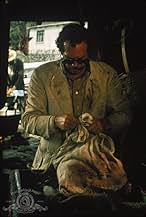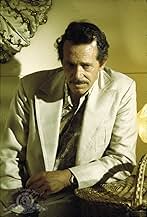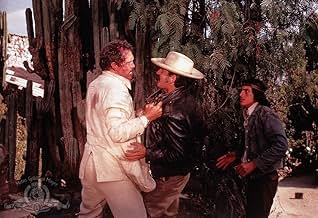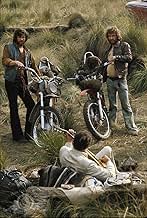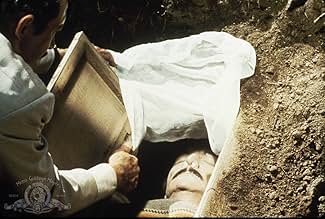Tragam-me a Cabeça de Alfredo Garcia
Título original: Bring Me the Head of Alfredo Garcia
AVALIAÇÃO DA IMDb
7,4/10
23 mil
SUA AVALIAÇÃO
Um pianista de bar e sua namorada prostituta viajam pelo submundo mexicano para receber uma recompensa pela cabeça de um gigolô morto.Um pianista de bar e sua namorada prostituta viajam pelo submundo mexicano para receber uma recompensa pela cabeça de um gigolô morto.Um pianista de bar e sua namorada prostituta viajam pelo submundo mexicano para receber uma recompensa pela cabeça de um gigolô morto.
- Direção
- Roteiristas
- Artistas
- Prêmios
- 2 indicações no total
Emilio Fernández
- El Jefe
- (as Emilio Fernandez)
Donnie Fritts
- John
- (as Donny Fritts)
Chalo González
- Chalo
- (as Chalo Gonzalez)
Avaliações em destaque
El Jefe is outraged to find that his daughter has fallen pregnant to a man who has upped and gone, after learning the identity of the rascal (Alfredo Garcia), he offers one million dollars to anyone who can bring him the head of the Lothario running man. On the trail are hit men Quill & Sappensly, Bennie & his prostitute girlfriend Elita, and some other Mexican bandit types, all of them are on a collision course that will bring far more than they all bargained for.
This was the one film where director Sam Peckinpah felt he had the most control, the one where we apparently get his own cut and not some chopped up piece of work from interfering executives. Viewing it now many years after its release it stands up well as a testament to the work of a great director. On the surface it looks trashy, we have homosexual hit men, grave robbing, potential rape, murders abound, prostitution, lower than the low characters, in short the film is awash with Peckinpah traits. Yet it would be a disservice to even think this film isn't rich in thematic texture, for the journey that Bennie that our main protagonist takes is one of meaning. He is a loser, but we find him on this quest to find not only fortune, but respect and love. It's a bloody trail for sure, but it has much depth and no little Peckinpah humour to push the film to the bloody but triumphant finale. Warren Oates is rewarded by Peckinpah for years of sterling work for him by getting the lead role of Bennie, and he grasps it with both hands to turn in a wonderful performance that splits sadness and vibrancy with deft of ease.
Bring Me The Head Of Alfredo Garcia has a harsh quality about it, be it the violence, or be it the sadness of the characters, but what isn't in doubt to me is that it's harshness is cloaked in Peckinpah splendour. 9/10
This was the one film where director Sam Peckinpah felt he had the most control, the one where we apparently get his own cut and not some chopped up piece of work from interfering executives. Viewing it now many years after its release it stands up well as a testament to the work of a great director. On the surface it looks trashy, we have homosexual hit men, grave robbing, potential rape, murders abound, prostitution, lower than the low characters, in short the film is awash with Peckinpah traits. Yet it would be a disservice to even think this film isn't rich in thematic texture, for the journey that Bennie that our main protagonist takes is one of meaning. He is a loser, but we find him on this quest to find not only fortune, but respect and love. It's a bloody trail for sure, but it has much depth and no little Peckinpah humour to push the film to the bloody but triumphant finale. Warren Oates is rewarded by Peckinpah for years of sterling work for him by getting the lead role of Bennie, and he grasps it with both hands to turn in a wonderful performance that splits sadness and vibrancy with deft of ease.
Bring Me The Head Of Alfredo Garcia has a harsh quality about it, be it the violence, or be it the sadness of the characters, but what isn't in doubt to me is that it's harshness is cloaked in Peckinpah splendour. 9/10
This dark, almost nihilistic film is apparently the only one of Peckinpah's not to be interfered with by a studio or someone of similar standing. The result is exactly what its director intended, a gritty and slow-burning pseudo neo-noir that takes its time getting to the squib-squirting shootouts that Peckinpah is known for. The story is centred around a head: the head of Alfredo Garcia, to be exact. After he impregnates a gang boss' young daughter, the man finds himself on the wrong end of an assassination contract. That's where our protagonist comes in; Oates' dive-bar pianist knows someone who knows where Garcia is, so he sets out to make some quick cash but gets much more than he bargained for. Most of the first half of 'Bring Me The Head Of Alfredo Garcia (1974)' is dedicated to the relationship between the hero and his girlfriend, which is given the time it needs to feel real. It's the underlying heart of the narrative. After a certain point, the picture takes a sharp turn and becomes a lot more bloody. Its final third sees its protagonist try to justify his actions in increasingly dangerous ways, taking violent risks seemingly for no real reason. In the end, though, that's the point: none of it was worth it and any reasoning is futile. It's a bleak conclusion, for sure, but it makes for a stark and distinct experience. Once it gets properly underway, the piece is rather enjoyable in a pulpy sort of sense. It's compelling to see our hero go through his downward spiral and there's this looming feeling of dread that builds as the thing approaches its conclusion. It's a dark flick, but it's often entertaining and is held together by a decent central relationship. 7/10
First, I'm sure everyone commenting on this film has seen the documentary on Peckinpah, and the comments made by the film critics regarding this film. If I may quote one of the critics, and I'm sure you all agree "It's the one film of Peckinpah's that everyone tries to imitate". Even Tarantino does to some degree. I have issues with Quentin Tarantino from a cinematic and artistic point of view, but that is another review. Warren Oates' performance was flawless, as he actually assumes the identity Of Sam Peckinpah as a gesture of appreciation for gracing him with his first starring vehicle.
Warren Oates was taking Sam's journey for him, as Sam looked from behind the lens. This movie was Peckinpah at his best and his worst at the same time. The old Peckinpah themes are there; Mexico is the final frontier, where one can continue to be what he once was in a changing world, but eventually Mexico begins to change as well. As I said in my review of "Junior Bonner" (be sure to check it out, and get back to me)progress is the main antagonist in the lives of Peckinpah's characters.
Junior Bonner and Bennie (Oates' Character) have a common foe, the twentieth century, which is why we find Bennie in Mexico. The chance to improve his situation, and establish a solid relationship with his hooker girlfriend (played with tough sincerity by Isela Vega) arrives at a time in Bennie's life when he least expects it, but it's not as easy as it is set out to be. All he has to do is bring this head to "El Hefe", and at the last minute BAM!! Bennie grows a conscience. Along the way he loses his woman, and then just goes nuts, thus revealing "The Diseased Soul of Sam Peckinpah".
My favorite scene is actually the picnic, where Elita and Bennie discuss their future. Elita begs Bennie to ask her to marry her, he does and she begins to weep. The simple fact that he says it is a tender moment, and shows how the slightest thing can arouse a woman's emotions. Jerry Fielding's musical score, which successfully created the mood and atmosphere for "Straw Dogs" (my all time favorite Peckinpah film) is present, but very muted. Still, this may be the best scene of the film.
Sam Peckinpah finally had complete control to dictate the direction of this film; Free from the money men, and left to his own devices in Mexico where he felt at home. A lot of people say that Pat Garret and Billy the Kid was the last Peckinpah masterpiece, but I think Alfredo Garcia was the last one. It throws you off at the beginning with the horses, then all of a sudden a Corvette screeches by; This is the paradox that really signifies that "The West" is over, bringing Sam Peckinpah and his love for the west full circle.
The critics literally hated this film, but 30 years later because of it we have a Martin Scorcese, a Robert Rodriguez, and a Quentin Tarantino (yeah) to name a few, as well as achieving underground cult status. I'm proud to call "Bring Me the Head of Alfredo Garcia" one of my favorite films.
Warren Oates was taking Sam's journey for him, as Sam looked from behind the lens. This movie was Peckinpah at his best and his worst at the same time. The old Peckinpah themes are there; Mexico is the final frontier, where one can continue to be what he once was in a changing world, but eventually Mexico begins to change as well. As I said in my review of "Junior Bonner" (be sure to check it out, and get back to me)progress is the main antagonist in the lives of Peckinpah's characters.
Junior Bonner and Bennie (Oates' Character) have a common foe, the twentieth century, which is why we find Bennie in Mexico. The chance to improve his situation, and establish a solid relationship with his hooker girlfriend (played with tough sincerity by Isela Vega) arrives at a time in Bennie's life when he least expects it, but it's not as easy as it is set out to be. All he has to do is bring this head to "El Hefe", and at the last minute BAM!! Bennie grows a conscience. Along the way he loses his woman, and then just goes nuts, thus revealing "The Diseased Soul of Sam Peckinpah".
My favorite scene is actually the picnic, where Elita and Bennie discuss their future. Elita begs Bennie to ask her to marry her, he does and she begins to weep. The simple fact that he says it is a tender moment, and shows how the slightest thing can arouse a woman's emotions. Jerry Fielding's musical score, which successfully created the mood and atmosphere for "Straw Dogs" (my all time favorite Peckinpah film) is present, but very muted. Still, this may be the best scene of the film.
Sam Peckinpah finally had complete control to dictate the direction of this film; Free from the money men, and left to his own devices in Mexico where he felt at home. A lot of people say that Pat Garret and Billy the Kid was the last Peckinpah masterpiece, but I think Alfredo Garcia was the last one. It throws you off at the beginning with the horses, then all of a sudden a Corvette screeches by; This is the paradox that really signifies that "The West" is over, bringing Sam Peckinpah and his love for the west full circle.
The critics literally hated this film, but 30 years later because of it we have a Martin Scorcese, a Robert Rodriguez, and a Quentin Tarantino (yeah) to name a few, as well as achieving underground cult status. I'm proud to call "Bring Me the Head of Alfredo Garcia" one of my favorite films.
It kills me the way the user comments on the IMDb are so often flooded with basic storyline information and/or outright spoilers. (i.e., "Warren Oates plays Benny, a drunken blah blah blah.") Everybody wants to be the next Roger Ebert (though God knows why.) "Bring Me The Head of Alfredo Garcia" is a title custom-designed to SAY ALL THAT NEEDS TO BE SAID. Tell me THAT title, tell me Warren Oates is in it, and I'm there. Granted, it's been a good 30 years, so some of the particulars of the story have leaked out. But read any other comments here, and you risk knowing more than you should the first time out with this one.
This movie flattened me. Desperation and flies, lots of flies. Yes, Peckinpah's films are violent. When I was a little kid in the early 70s, way before I was allowed to see movies like this, I knew of Peckinpah's reputation. Now I see that the violence herein is a total smokescreen, a sign of the times, a way to sell movie tickets. Human emotion is where these films are really at.
Peckinpah was Jim Thompson with a camera, and he told some great stories in a maverick style. Today's pre-fab, "hip" postmodern filmmakers are not worthy of a brutal, bizarre tale such as this. Sure, Kill Bill was a lot of fun - but the viewer hovers safely on the perimeter, like one flipping noncommittally (if enthusiastically) through the pages of a comic book. You will not be able to view Bring Me The Head of Alfredo Garcia with such entertainment-value indifference. You'll be up all night typing (like me), or drinking, or doing whatever it is you do when your head is reeling from a true cathartic viewing experience.
This movie flattened me. Desperation and flies, lots of flies. Yes, Peckinpah's films are violent. When I was a little kid in the early 70s, way before I was allowed to see movies like this, I knew of Peckinpah's reputation. Now I see that the violence herein is a total smokescreen, a sign of the times, a way to sell movie tickets. Human emotion is where these films are really at.
Peckinpah was Jim Thompson with a camera, and he told some great stories in a maverick style. Today's pre-fab, "hip" postmodern filmmakers are not worthy of a brutal, bizarre tale such as this. Sure, Kill Bill was a lot of fun - but the viewer hovers safely on the perimeter, like one flipping noncommittally (if enthusiastically) through the pages of a comic book. You will not be able to view Bring Me The Head of Alfredo Garcia with such entertainment-value indifference. You'll be up all night typing (like me), or drinking, or doing whatever it is you do when your head is reeling from a true cathartic viewing experience.
Watching this unforgettable near masterpiece for the first time it's impossible to understand why it isn't regarded as one of the greatest movies of the 70s - a decade that produced an astonishing amount of classics. How Maltin can dismiss it with the throwaway comment "sub-par bloodbath" defies belief! Almost everything about this movie is perfect, but the cornerstone is Warren Oates performance, perhaps his greatest. Rarely do you see such a completely engrossing, believable portrayal of a man who has lost EVERYTHING, who knows he cannot win, but also knows that he must keep going to the very end. Once seen, never forgotten may seem like a trite comment, but in this case it says it all. You will NEVER forget this movie!
Você sabia?
- CuriosidadesAccording to Gordon T. Dawson, principal photography was marked with an overwhelming sense of melancholy and defeat, perhaps engendered by Sam Peckinpah's use of cocaine (introduced to him by Oates). The screenwriter (a veteran of several Peckinpah films) was so unnerved by the shift in Peckinpah's mental state and mercurial behavior that he resolved never to work with him again.
- Erros de gravaçãoAs Bennie crosses inside his apartment, alone, and talks to Alfredo's head, a crewman in black clothing is visible, ducking behind an adjacent transom. His arm reappears a second later, as Bennie reaches for a bottle in the pantry.
- Cenas durante ou pós-créditosThere are only three credits at the beginning of the film: The production credit, the two stars, and the story/screenplay. Everything else is at the end, and the film's title is the very last credit.
- ConexõesFeatured in Sam Peckinpah: Homem de Ferro (1993)
- Trilhas sonorasBennie's Song
by Isela Vega
Principais escolhas
Faça login para avaliar e ver a lista de recomendações personalizadas
- How long is Bring Me the Head of Alfredo Garcia?Fornecido pela Alexa
Detalhes
- Data de lançamento
- Países de origem
- Idiomas
- Também conhecido como
- Tráiganme la cabeza de Alfredo García
- Locações de filme
- Empresas de produção
- Consulte mais créditos da empresa na IMDbPro
Bilheteria
- Orçamento
- US$ 1.500.000 (estimativa)
- Faturamento bruto mundial
- US$ 19.418
Contribua para esta página
Sugerir uma alteração ou adicionar conteúdo ausente

Principal brecha
By what name was Tragam-me a Cabeça de Alfredo Garcia (1974) officially released in Canada in French?
Responda


